2019年春外研版高中英语必修四Module 3 Body Language and Non-Verbal Communication Listening & Speaking & Writing课件
文档属性
| 名称 | 2019年春外研版高中英语必修四Module 3 Body Language and Non-Verbal Communication Listening & Speaking & Writing课件 |
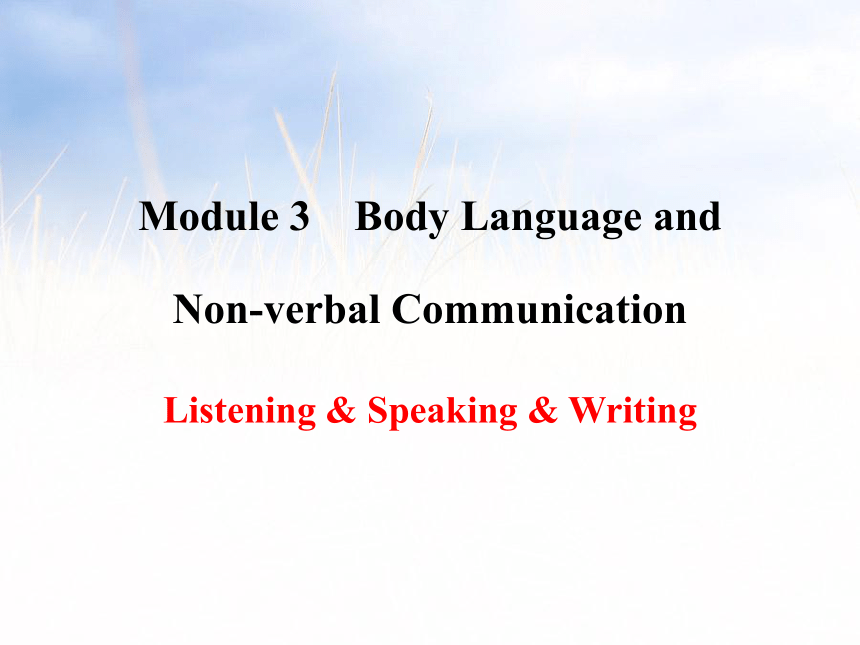
|
|
| 格式 | zip | ||
| 文件大小 | 2.6MB | ||
| 资源类型 | 教案 | ||
| 版本资源 | 外研版 | ||
| 科目 | 英语 | ||
| 更新时间 | 2019-04-20 00:00:00 | ||
图片预览

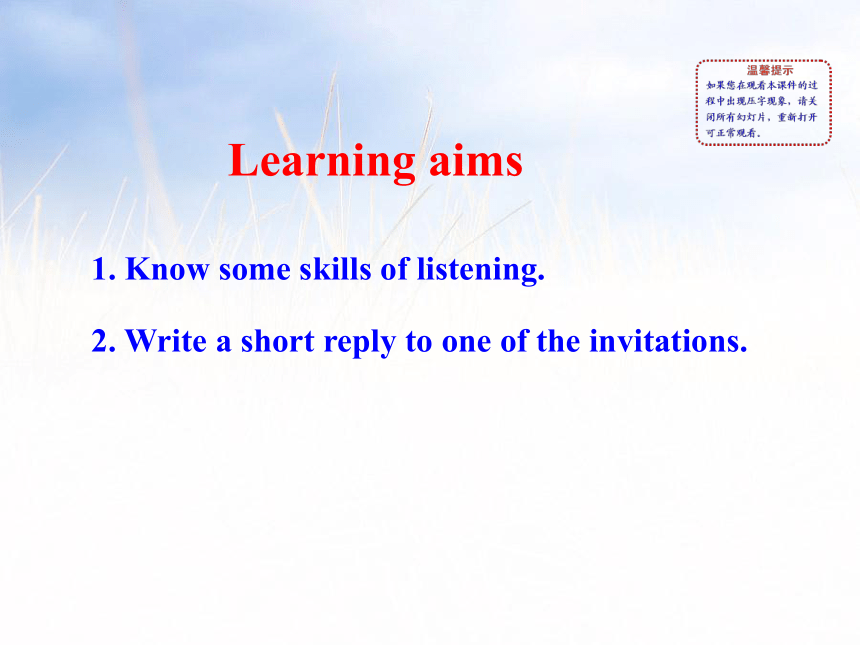
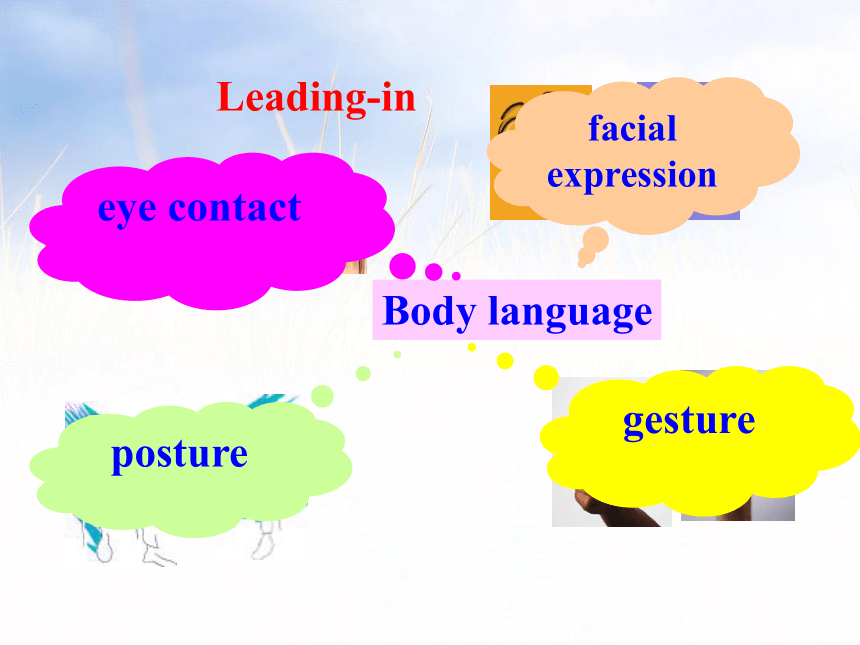
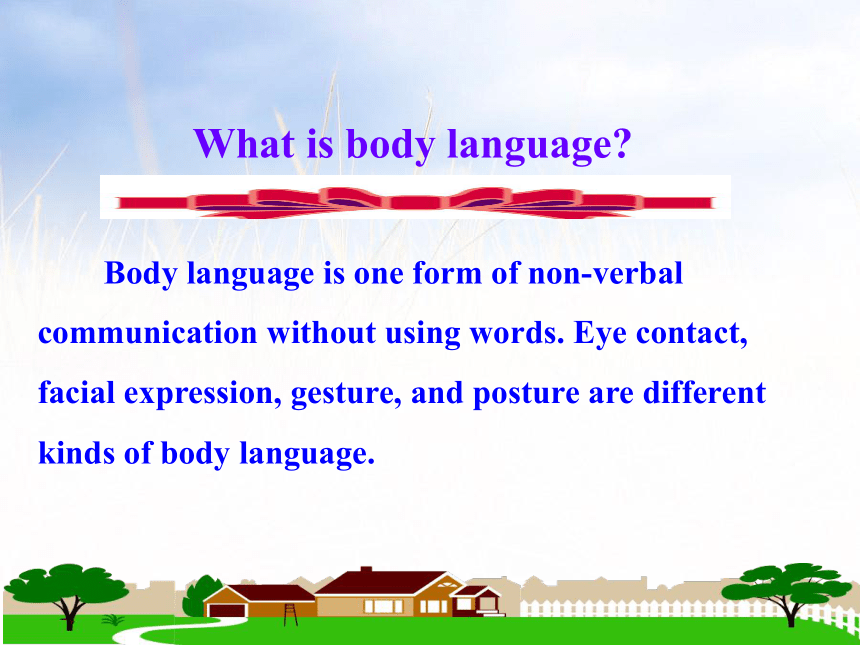
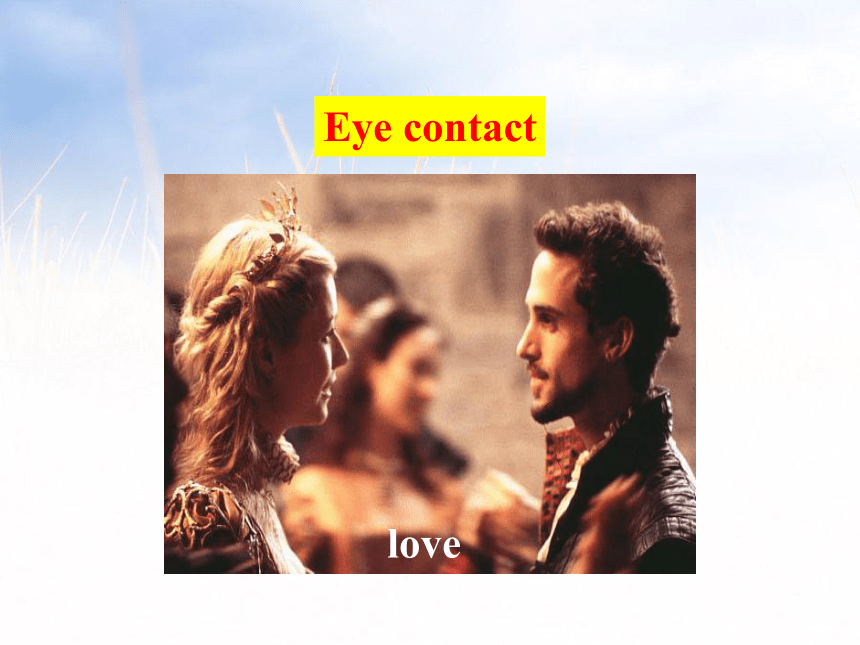

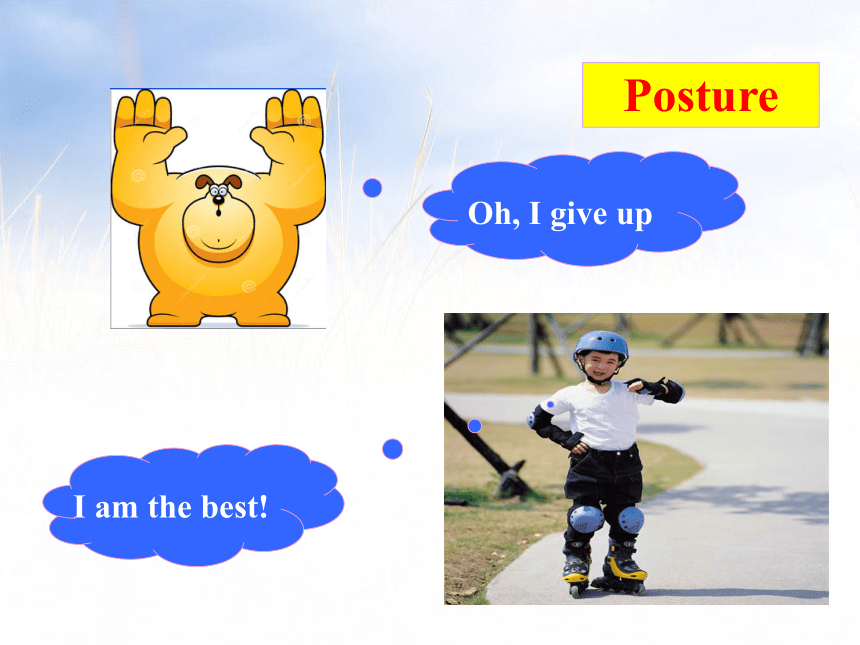

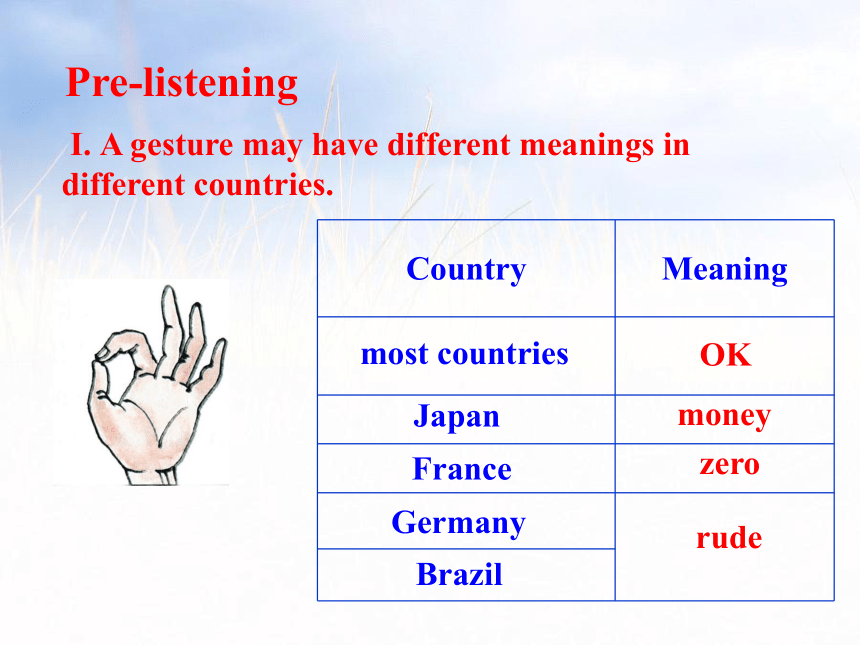
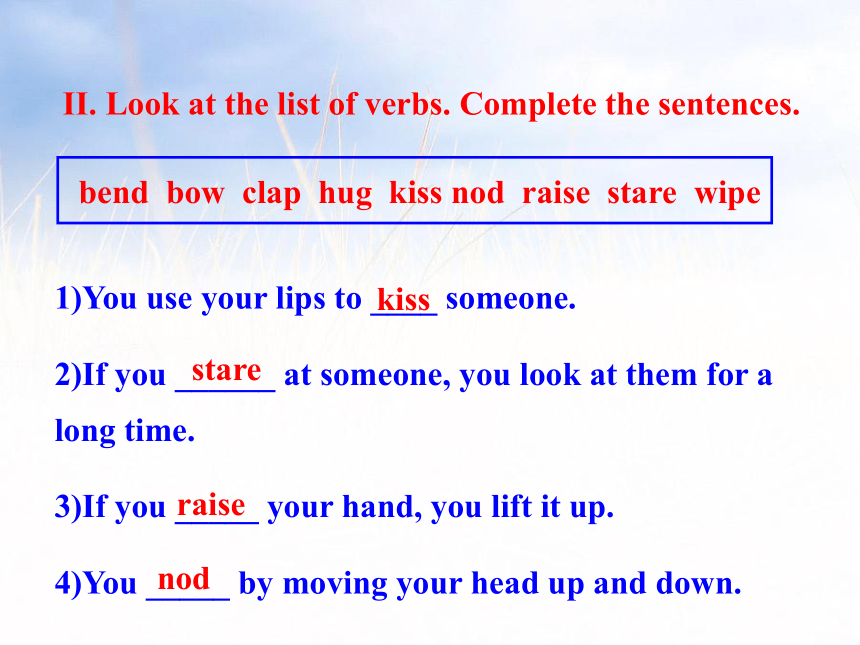
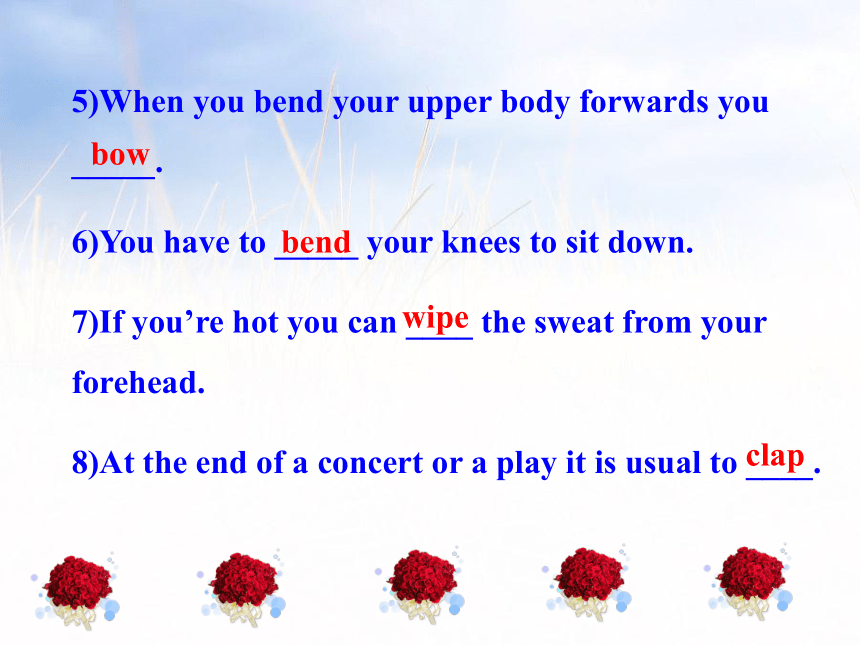
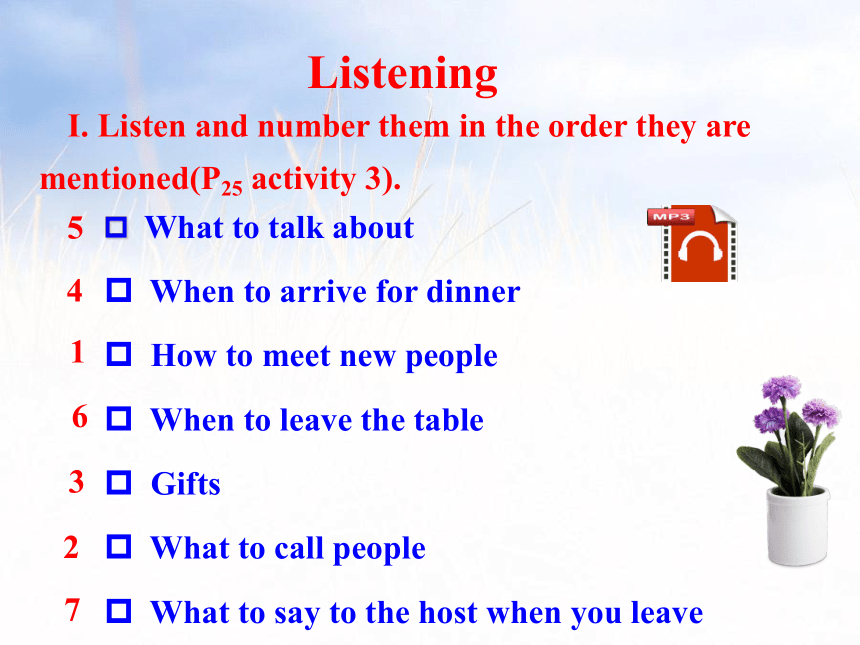
文档简介
课件32张PPT。Module 3 Body Language and
Non-verbal Communication
Listening & Speaking & Writing1. Know some skills of listening.
2. Write a short reply to one of the invitations.
Learning aimsBody languageposturegestureeye contactLeading-in facial expressionWhat is body language? Body language is one form of non-verbal communication without using words. Eye contact, facial expression, gesture, and posture are different kinds of body language.Eye contactlove Facial ExpressionsOh, I give up PostureI am the best! Good!
Well done!
gestureVictory!
Keep silent!
Stop!
zerorudemoneyOKmost countriesJapanFranceGermanyBrazil I. A gesture may have different meanings in different countries.Pre-listening II. Look at the list of verbs. Complete the sentences.
1)You use your lips to ____ someone.
2)If you ______ at someone, you look at them for a long time.
3)If you _____ your hand, you lift it up.
4)You _____ by moving your head up and down.bend bow clap hug kiss nod raise stare wipekissstare raisenod5)When you bend your upper body forwards you _____.
6)You have to _____ your knees to sit down.
7)If you’re hot you can ____ the sweat from your forehead.
8)At the end of a concert or a play it is usual to ____.bowbendwipeclap What to talk about
When to arrive for dinner
How to meet new people
When to leave the table
Gifts
What to call people
What to say to the host when you leave6541327I. Listen and number them in the order they are mentioned(P25 activity 3).ListeningII. Match the following pieces of advice with the
topics in activity 3.
a.You should shake hands when you meet new
people. _____________________
b. You should bring some flowers or a bottle of wine.
______
c. You should open gifts immediately. ______
d. You shouldn’t use family names. _________________
e. You shouldn’t arrive too late. ___________________
______How to meet new peopleGiftsGiftsWhat to call peopleWhen to arrive for dinnerf. You shouldn’t talk about politics or religion.
__________________
g. You mustn’t leave as soon as you finish the meal._______________________
h. You must thank your host for a wonderful
evening.___________________________________
i. You mustn’t arrive early. ______________________What to talk aboutWhen to leave the tableWhat to say to the host when you leaveWhen to arrive for dinnerWhat should Li Hong do when she is invited to dinner?What can Li Hong talk about?When can Li Hong leave the table?What should Li Hong do when she leaves?She should bring a gift for host, for example,
some flowers or a bottle of wine.She shouldn’t talk about politics or religion, and she can talk about weather.She mustn’t leave the table as soon as she
finishes the meal.She must thank the host for a wonderful
evening.III .Listen again and answer!Work in pairs. Do this role-play.SpeakingStudent A: An American visitor to China. Ask B for advice on Chinese customs.
Student B: A Chinese student. Student A’s friend. Give A advice using should or must or sentences beginning with if. Situations:
be introduced to others; be invited;
meet someone familiar; talk to people;
say goodbye…Pre-writing1.Read and answer:
1)Who is the first invitation from?
2)Who is the second invitation from?
3)Which is formal or informal? How do you know?
Mr. and Mrs. Harry Blunkett.Sylvia. The first invitation is formal.
We know because of the language used. 2.Look at these expressions. Which are formal, and which are informal?pleased to accept /unable to accept/ Thanks a lot / I’m very sorryThe key: “Thanks a lot” is informal;
the other three are formal. 3.Conclusion:
邀请函包括宴会、舞会、晚餐、聚会、婚礼等各种邀请信件,形式上大体分为两种:一种为正规的格式 (formal correspondence);一种是非正式格式(informal correspondence)。
邀请信一定要将邀请的时间(年、月、日、钟点)、地点、场合写清楚,不能使接信人存在任何疑虑。 邀请信的回复
邀请信的复信要求简明扼要,在书写时应注意以下几点:
1) 接受邀请的复信中应重复写上邀请信中的某些内容,如邀请年、月、日,星期几、几点钟等,如 “I’ll be delighted to attend your luncheon next Friday, May the fifth, at twelve o’clock”.。Writing2) 邀请信的复信中应明确表明接受邀请还是不接受邀请,不能含糊其辞,如不能写 “I’ll come if I’m in town.” 这类的话,以致对方无法做出安排。在接受邀请的复信中,应对受到邀请表示高兴。谢绝的复信中应阐明不能应邀的缘由。Write a short reply to one of the invitations. Use one of the expressions from activity 2.(P28) Dear Mr and Mrs Blunkett,
I was delighted to receive the invitation to your daughter’s wedding on March 5th.I am very pleased to accept, and look forward to meeting you there.
Yours sincerely,
Peter J. Smith 1.stare v .凝视,盯着看
He sat there, staring into the space.
他坐在那儿,凝视着太空。
【知识拓展】
stare at 目不转睛地看, 凝视, 盯着 Don’t stare at me like that.
不要那样盯着我看。Language points【易混辨析】stare atglare atglance at
stare at “盯着看,凝视”;眼神很集中
glare at “怒视”,相当于 stare angrily
glance at “瞥一眼,匆匆看一眼”他肯定已经感觉到我正在看他。他突然扫视了我一眼然后平静地说:“你为什么一直那样看着我?”【即学即练】
选用stare atglare atglance at的适当形式填空。He must have sensed that I was looking at him. He suddenly __________me and said quietly, “Why are
you __________me like that?”glanced at staring at 2. request vt. /n. 请求;恳求
Mr. Wang made a request that I should help him.
王先生请求我帮助他。
I requested him to come before ten.
我要求他十点以前来。
They requested financial support.
他们要求财务资助。【知识拓展】
request that +主语+(should)+ do sth. 要求
request sb. to do sth. 要求某人做某事
at sb’s request 应某人的要求 3. favour n. 帮助,恩惠,赞成,支持,关心
v. 赞成,照顾
Do me a favour and turn the radio down while I’m on the phone, will you?
我打电话的时候,请帮忙把收音机声音调小点好吗?
Was he in favour of the death penalty?
他赞成死刑吗? 【知识拓展】
do sb. a favour / do a favour for sb. 帮某人的忙
do sb. the favour to do sth. 帮某人做某事
in favour of 赞成,支持,有利于
favour the new plan 赞成新计划
favour sb. /sth. 偏爱,偏袒某人;便于,利于1Write a short reply to the invitation, when you were invited to take part in your classmate’s birthday party.HomeworkDesire to enhance the enthusiasm, perseverance in order to slick mountain.
欲望以提升热忱,毅力以磨平高山。
Non-verbal Communication
Listening & Speaking & Writing1. Know some skills of listening.
2. Write a short reply to one of the invitations.
Learning aimsBody languageposturegestureeye contactLeading-in facial expressionWhat is body language? Body language is one form of non-verbal communication without using words. Eye contact, facial expression, gesture, and posture are different kinds of body language.Eye contactlove Facial ExpressionsOh, I give up PostureI am the best! Good!
Well done!
gestureVictory!
Keep silent!
Stop!
zerorudemoneyOKmost countriesJapanFranceGermanyBrazil I. A gesture may have different meanings in different countries.Pre-listening II. Look at the list of verbs. Complete the sentences.
1)You use your lips to ____ someone.
2)If you ______ at someone, you look at them for a long time.
3)If you _____ your hand, you lift it up.
4)You _____ by moving your head up and down.bend bow clap hug kiss nod raise stare wipekissstare raisenod5)When you bend your upper body forwards you _____.
6)You have to _____ your knees to sit down.
7)If you’re hot you can ____ the sweat from your forehead.
8)At the end of a concert or a play it is usual to ____.bowbendwipeclap What to talk about
When to arrive for dinner
How to meet new people
When to leave the table
Gifts
What to call people
What to say to the host when you leave6541327I. Listen and number them in the order they are mentioned(P25 activity 3).ListeningII. Match the following pieces of advice with the
topics in activity 3.
a.You should shake hands when you meet new
people. _____________________
b. You should bring some flowers or a bottle of wine.
______
c. You should open gifts immediately. ______
d. You shouldn’t use family names. _________________
e. You shouldn’t arrive too late. ___________________
______How to meet new peopleGiftsGiftsWhat to call peopleWhen to arrive for dinnerf. You shouldn’t talk about politics or religion.
__________________
g. You mustn’t leave as soon as you finish the meal._______________________
h. You must thank your host for a wonderful
evening.___________________________________
i. You mustn’t arrive early. ______________________What to talk aboutWhen to leave the tableWhat to say to the host when you leaveWhen to arrive for dinnerWhat should Li Hong do when she is invited to dinner?What can Li Hong talk about?When can Li Hong leave the table?What should Li Hong do when she leaves?She should bring a gift for host, for example,
some flowers or a bottle of wine.She shouldn’t talk about politics or religion, and she can talk about weather.She mustn’t leave the table as soon as she
finishes the meal.She must thank the host for a wonderful
evening.III .Listen again and answer!Work in pairs. Do this role-play.SpeakingStudent A: An American visitor to China. Ask B for advice on Chinese customs.
Student B: A Chinese student. Student A’s friend. Give A advice using should or must or sentences beginning with if. Situations:
be introduced to others; be invited;
meet someone familiar; talk to people;
say goodbye…Pre-writing1.Read and answer:
1)Who is the first invitation from?
2)Who is the second invitation from?
3)Which is formal or informal? How do you know?
Mr. and Mrs. Harry Blunkett.Sylvia. The first invitation is formal.
We know because of the language used. 2.Look at these expressions. Which are formal, and which are informal?pleased to accept /unable to accept/ Thanks a lot / I’m very sorryThe key: “Thanks a lot” is informal;
the other three are formal. 3.Conclusion:
邀请函包括宴会、舞会、晚餐、聚会、婚礼等各种邀请信件,形式上大体分为两种:一种为正规的格式 (formal correspondence);一种是非正式格式(informal correspondence)。
邀请信一定要将邀请的时间(年、月、日、钟点)、地点、场合写清楚,不能使接信人存在任何疑虑。 邀请信的回复
邀请信的复信要求简明扼要,在书写时应注意以下几点:
1) 接受邀请的复信中应重复写上邀请信中的某些内容,如邀请年、月、日,星期几、几点钟等,如 “I’ll be delighted to attend your luncheon next Friday, May the fifth, at twelve o’clock”.。Writing2) 邀请信的复信中应明确表明接受邀请还是不接受邀请,不能含糊其辞,如不能写 “I’ll come if I’m in town.” 这类的话,以致对方无法做出安排。在接受邀请的复信中,应对受到邀请表示高兴。谢绝的复信中应阐明不能应邀的缘由。Write a short reply to one of the invitations. Use one of the expressions from activity 2.(P28) Dear Mr and Mrs Blunkett,
I was delighted to receive the invitation to your daughter’s wedding on March 5th.I am very pleased to accept, and look forward to meeting you there.
Yours sincerely,
Peter J. Smith 1.stare v .凝视,盯着看
He sat there, staring into the space.
他坐在那儿,凝视着太空。
【知识拓展】
stare at 目不转睛地看, 凝视, 盯着 Don’t stare at me like that.
不要那样盯着我看。Language points【易混辨析】stare atglare atglance at
stare at “盯着看,凝视”;眼神很集中
glare at “怒视”,相当于 stare angrily
glance at “瞥一眼,匆匆看一眼”他肯定已经感觉到我正在看他。他突然扫视了我一眼然后平静地说:“你为什么一直那样看着我?”【即学即练】
选用stare atglare atglance at的适当形式填空。He must have sensed that I was looking at him. He suddenly __________me and said quietly, “Why are
you __________me like that?”glanced at staring at 2. request vt. /n. 请求;恳求
Mr. Wang made a request that I should help him.
王先生请求我帮助他。
I requested him to come before ten.
我要求他十点以前来。
They requested financial support.
他们要求财务资助。【知识拓展】
request that +主语+(should)+ do sth. 要求
request sb. to do sth. 要求某人做某事
at sb’s request 应某人的要求 3. favour n. 帮助,恩惠,赞成,支持,关心
v. 赞成,照顾
Do me a favour and turn the radio down while I’m on the phone, will you?
我打电话的时候,请帮忙把收音机声音调小点好吗?
Was he in favour of the death penalty?
他赞成死刑吗? 【知识拓展】
do sb. a favour / do a favour for sb. 帮某人的忙
do sb. the favour to do sth. 帮某人做某事
in favour of 赞成,支持,有利于
favour the new plan 赞成新计划
favour sb. /sth. 偏爱,偏袒某人;便于,利于1Write a short reply to the invitation, when you were invited to take part in your classmate’s birthday party.HomeworkDesire to enhance the enthusiasm, perseverance in order to slick mountain.
欲望以提升热忱,毅力以磨平高山。
